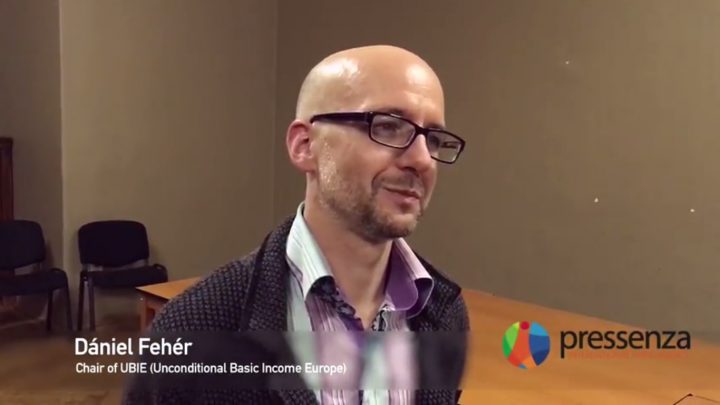On Friday the 23rd of November a public conference took place at the Hungarian Institute of Political History in Budapest, hosted by the First Hungarian Unconditional Basic Income Association together with the Progressive Hungary Foundation and bringing together members of the Unconditional Basic Income Europe network. The primary subject under discussion was how to get Basic Income into the public consciousness by taking advantage of the upcoming European Elections in May 2019, but another important issue was the possibility of organising a European Citizens Initiative to have Basic Income considered at the European Parliament.
Network partners came from across Europe for the occasion, and we took the chance to interview Dániel Fehér, the chair of the network.
Video and questions by Angel Bravo, edited by Álvaro Orus.
Hi, I’m Dániel Fehér. I’m from Hungary but I live in Berlin and I’m the chair of the network for Unconditional Basic Income Europe.
Pressenza: What is the principal purpose of today’s meeting?
DF: We came here to Budapest today to see where the idea of basic income stands in Europe, discussions about experiments, to see what concrete political proposals we have based on this idea and to discuss what we need to do so these ideas can become political reality in Europe.
PZ: A large part of this meeting is dedicated to the European Citizen’s Initiative about the basic income. Has it already been decided to launch the campaign, and what kind of basic income scheme does it want to propose?
DF: It’s not decided yet that’s why we meet here with the network tomorrow and Sunday to discuss the pros and cons, difficulties, and chances with such a campaign. You know the European Citizens Initiative is let’s say a mixed weapon, so it can of course address a lot of people, but it also needs lots of resources, organizational capacity and at the present it’s also a very weak political tool. So it doesn’t force the European Union to do anything, just the fact that you have succeeded collecting one million signatures. So we need to discuss this, how this tool fits our strategic goals, if that’s the best tool to promote basic income in Europe and bring it closer to reality, and if we decide to do this of course also the question is, what exactly are we going to demand? And that’s also still an open question. For now, we have different proposals. We want first to focus not so much on the proposals, but first to discuss some criteria. So that’s a good proposal, a good campaign that the idea has to fulfil, but for example what we discussed today a lot around the idea of Eurodividends, a partial European basic income that all European citizens would receive from the EU. That could be for example included in a demand for this campaign.
PZ: In 2013, there was a citizen’s initiative about the basic income. Why would you repeat it again, and what didn’t work last time?
DF: I would say the situation is quite different today. So I think also the discussion around basic income has progressed a lot. A lot more people know about this proposal and support this idea. We have also more possibilities to reach people. So when the first European Citizens Initiative was done it was when this tool came into force and it had a lot of starting difficulties. So actually we could not collect the signatures for 12 months because the online signature gathering tool did not work in the beginning. So also there is a reform process going on at a European level. At some point in the near future that might be reforms to the ECI so that it becomes more effective, less cumbersome to collect the signatures. We need to take all this into account when deciding to start the campaign.
PZ: A Citizens Initiative requires you to collect 1 million signatures, in at least seven countries of the European Union. Your network counts on sufficient activists and with the necessary help of other organizations and social movements in order to carry out such an activity?
DF: Definitely. I mean if you say well 1 million signatures compared to 500 million Europeans might not be that much, then you most likely have not tried to collect that many signatures yet. It’s a huge challenge. We know that. It’s not something that our activists alone can do. We need of course allies, and that’s part of the challenge we are going to discuss: how to plan this campaign, whom to ask to join the campaign, and what could be the reasons for others to join this campaign. So, yes, I think we need a big alliance, but I think that there are also good chances. There are many movements, also political parties and other organizations around Europe who could have an interest in bringing this campaign forward for more solidarity within Europe, a more social Europe.
PZ: And finally, is there a specific reason why Budapest was chosen as the host city for this event, and not a city in countries where the network is more developed like in Germany, Holland, France or Spain?
DF: Yes, partially we also chose it for practical reasons, because we knew that there are organizations here who are interested in organizing this weekend together with us, and can be of practical help, but it’s also a sign exactly to those countries where the movement is not that developed, yet. So, I think our job as a European Network is to support more those initiatives in countries that need our help and not so much networks that are already strong.






